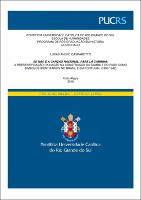| Share record |


|
Please use this identifier to cite or link to this item:
https://tede2.pucrs.br/tede2/handle/tede/8706| Document type: | Tese |
| Title: | Se não é a canção nacional, para lá caminha : a presentificação da nação na construção do samba e do fado como símbolos identitários no Brasil e em Portugal (1890-1942) |
| Author: | Gasparotto, Lucas André  |
| Advisor: | Paredes, Marçal de Menezes |
| Abstract (native): | No início do século XXI, o samba, no Brasil, e o fado, em Portugal, foram reconhecidos por órgãos nacionais e internacionais como expressões culturais simbólicas das identidades brasileira e portuguesa. Contudo, se ocupam, atualmente, um lugar no panteão nacional de seus respectivos países no âmbito da música, a análise de seus percursos históricos expõe interpretações dissonantes acerca dos critérios capazes de defini-los como manifestações tradicionais. Este trabalho coloca em perspectiva histórica as diferentes leituras sobre o povo e a nação presentes no processo de construção desses gêneros musicais como símbolos identitários. Através de um conjunto de fontes heterogêneas, desierarquizadas e encaradas como discursos produtores de sentido, investiga-se como diferentes interpretações da nacionalidade forneceram a matéria capaz de corporificar a “presentificação” da nação em três contextos específicos em que o samba e o fado surgem como “expressão do popular”, como “folclore urbano” e como “canção nacional”. Expondo distintas camadas históricas, os discursos da e referente à música conformaram identidades fissuradas resultantes da diversidade de elementos que compõem a coletividade nacional reunida nas noções de povo e nação. |
| Abstract (english): | At the beginning of the 21st century, samba in Brazil and fado in Portugal were recognized by national and international organizations as symbolic cultural expressions of Brazilian and Portuguese national identities. However, if nowadays they belong to the national pantheon of their respective countries in the field of music, the analysis of their historical paths shows dissonant interpretations about the criteria that defines both samba and fado as traditional manifestations. This work analyzes the different interpretations of people and nation present in the historical construction of these musical genres as identity symbols. Through a set of heterogeneous, unarticulated sources, regarded as meaning-producing discourses, one investigates how different interpretations of nationality provided the material capable of embodying the "presentiment" of the nation in three specific contexts in which samba and fado appear as "popular culture", as "urban folklore" and as "national song". Exposing different historical layers, the discourses from the music and the ones referring to it conformed fissured identities, result of the diversity of elements that compose the national collectivity gathered in the notions of people and nation. |
| Keywords: | Samba Fado Nação Identidade Nacional Música Popular |
| CNPQ Knowledge Areas: | CIENCIAS HUMANAS::HISTORIA |
| Language: | por |
| Country: | Brasil |
| Publisher: | Pontifícia Universidade Católica do Rio Grande do Sul |
| Institution Acronym: | PUCRS |
| Department: | Escola de Humanidades |
| Program: | Programa de Pós-Graduação em História |
| Access type: | Acesso Aberto |
| Fulltext access restriction: | Trabalho não apresenta restrição para publicação |
| URI: | http://tede2.pucrs.br/tede2/handle/tede/8706 |
| Issue Date: | 29-Mar-2019 |
| Appears in Collections: | Programa de Pós-Graduação em História |
Files in This Item:
| File | Description | Size | Format | |
|---|---|---|---|---|
| GASPAROTTO_LUCAS_tese_versão final.pdf | LUCAS_ANDRÉ_GASPAROTTO_TES | 3.15 MB | Adobe PDF |  Download/Open Preview |
Items in DSpace are protected by copyright, with all rights reserved, unless otherwise indicated.




